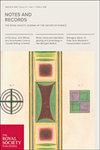仪器冒险:克里斯托弗·米德尔顿岌岌可危的职业生涯中的科学和航海
IF 0.6
3区 哲学
Q3 HISTORY & PHILOSOPHY OF SCIENCE
Notes and Records-The Royal Society Journal of the History of Science
Pub Date : 2019-09-20
DOI:10.1098/rsnr.2018.0046
引用次数: 1
摘要
克里斯托弗·米德尔顿(Christopher Middleton,1770年)是一名船长,最初在哈德逊湾连服役,后来在皇家海军服役,1742年被授予皇家学会科普利奖章。埃德蒙德·哈雷在《哲学汇刊》上发表了一系列变化表,鼓励他早期研究北纬地区的磁变化。这些表格说明了米德尔顿从海员对变化感兴趣的优先事项转变为社会更广泛、自然的哲学议程。它们也说明了他对新颖仪器的热情,特别是用于海上的高度仪器,如哈德利象限。阿瑟·多布斯说服米德尔顿辞去哈德逊湾公司的职务,接受皇家海军的委托,指挥一支探险队从哈德逊湾寻找通往东印度群岛的西北通道。正是他对这次航行的报道为他赢得了科普利奖章,但对米德尔顿来说,这也导致了与多布斯之间的激烈且毁灭性的公开争论。米德尔顿是一位杰出的海员,也是一位名不见经传的奖牌获得者。本文章由计算机程序翻译,如有差异,请以英文原文为准。
Adventures with instruments: science and seafaring in the precarious career of Christopher Middleton
Christopher Middleton (d. 1770) was a sea captain, first with the Hudson's Bay Company, then in the Royal Navy, who was awarded the Royal Society's Copley Medal in 1742. His early work on magnetic variation in northern latitudes was encouraged by Edmond Halley, as he published a series of tables of variation in the Philosophical Transactions. These tables illustrate Middleton's transition from the priorities characteristic of the seaman's interest in variation to the wider, natural philosophical agenda of the Society. They illustrate also his enthusiasm for novel instrumentation, in particular altitude instruments for use at sea, such as Hadley's quadrant. Middleton was persuaded by Arthur Dobbs to resign from the Hudson's Bay Company and accept a commission in the Royal Navy so as to command an expedition to search for a Northwest Passage to the East Indies from Hudson's Bay. It was his report on this voyage that won him the Copley Medal but which also led to a bitter and, for Middleton, ruinous public dispute with Dobbs. Middleton emerges as an outstanding seaman and a worthy, if relatively unknown, medallist.
求助全文
通过发布文献求助,成功后即可免费获取论文全文。
去求助
来源期刊
CiteScore
1.50
自引率
0.00%
发文量
45
审稿时长
>12 weeks
期刊介绍:
Notes and Records is an international journal which publishes original research in the history of science, technology and medicine.
In addition to publishing peer-reviewed research articles in all areas of the history of science, technology and medicine, Notes and Records welcomes other forms of contribution including: research notes elucidating recent archival discoveries (in the collections of the Royal Society and elsewhere); news of research projects and online and other resources of interest to historians; essay reviews, on material relating primarily to the history of the Royal Society; and recollections or autobiographical accounts written by Fellows and others recording important moments in science from the recent past.

 求助内容:
求助内容: 应助结果提醒方式:
应助结果提醒方式:


